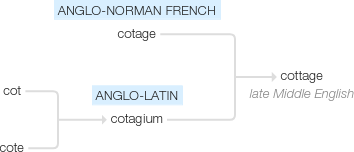Cottage
late Middle English: from Anglo-Norman French cotage and Anglo-Latin cotagium, from cot2 or cote.
wiktionary
Late Middle English, from Anglo-Norman cotage and Medieval Latin cotagium, from Old Northern French cot, cote(“hut, cottage”) + -age(“surrounding property”), from Proto-Germanic *kutan, *kuta-(“shed”), probably of non-Indo-European origin, but possibly borrowed from Uralic; compare Finnish kota(“hut, house”) and Hungarian ház(“house”), both from Proto-Finno-Ugric/Proto-Uralic *kota. However, also compare Dutch and English hut. [1] [2]
Old Northern French cote is probably from Old Norse kot(“hut”), cognate of Old English cot of same Proto-Germanic origin.
Slang sense “public toilet” from 19th century, due to resemblance.
etymonline
cottage (n.)
late 14c., "a cot, a humble habitation," as of a farm-laborer, from Old French cote "hut, cottage" + Anglo-French suffix -age (according to OED the whole probably denotes "the entire property attached to a cote"). Old French cot is probably from Old Norse kot "hut," cognate of Old English cot, cote "cottage, hut," from Proto-Germanic *kutan (source also of Middle Dutch cot, Dutch kot).
Meaning "small country residence or detached suburban house" (without suggestion of poverty or tenancy) is from 1765. Modern French cottage is a 19c. reborrowing from English. Cottage industry, one that can be done at home, is attested from 1854. Cottage cheese, the U.S. name for a kind of soft, white cheese, is attested from 1831, earliest in reference to Philadelphia:
There was a plate of rye-bread, and a plate of wheat, and a basket of crackers; another plate with half a dozen paltry cakes that looked as if they had been bought under the old Court House; some morsels of dried beef on two little tea-cup plates: and a small glass dish of that preparation of curds, which in vulgar language is called smear-case, but whose nom de guerre is cottage-cheese, at least that was the appellation given it by our hostess. ["Miss Leslie," "Country Lodgings," Godey's Lady's Book, July 1831]
